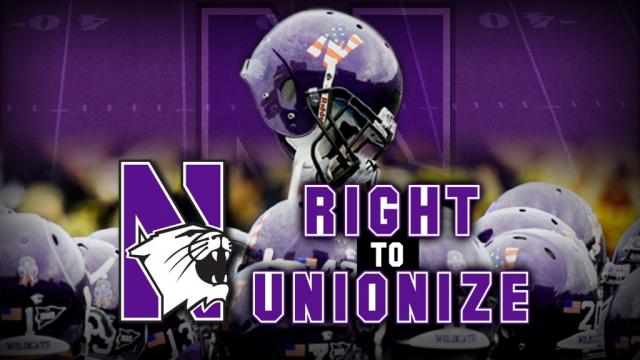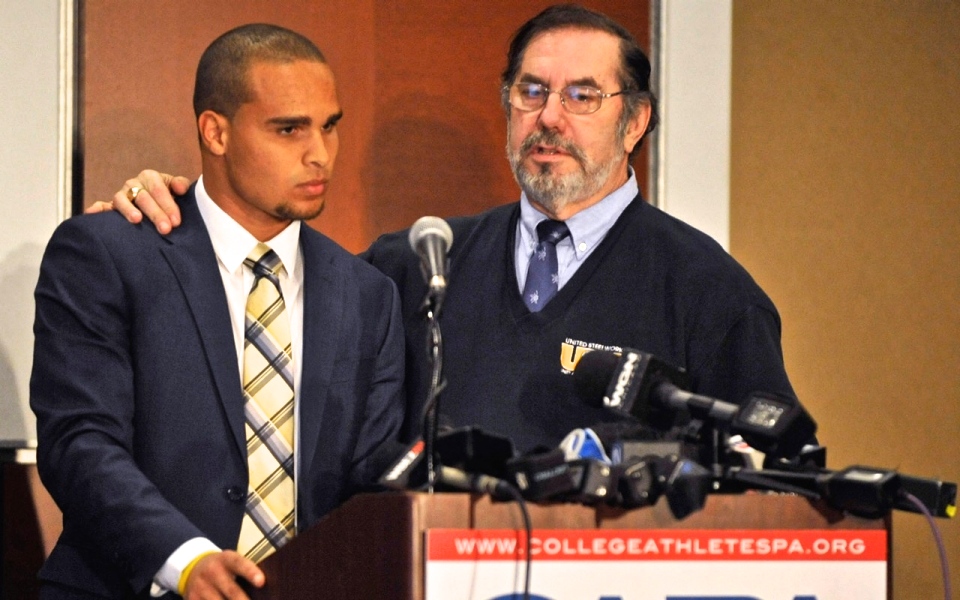
The long-established schoolyard ethnography of “The Breakfast Club” tell us that jocks and nerds are supposed to have little in common. But on the university campus, these two disparate groups have found a vital shared interest: unionization.
Grad students and college athletes are now challenging the norms and regulations that keep them underpaid and overburdened. In April scholarship football players at Northwestern University voted to form a union. Although the results of their drive are still being decided by the National Labor Relations Board in a process that is likely to take months to resolve, their push for unionization could set a precedent for Division I athletes at private institutions across the country.
There is a longer lineage of organizing among the graduate students who do a sizable amount of teaching and grading at many universities. This winter New York University grad students overwhelming voted to unionize, again, after nearly 15 years of labor strife, including an acrimonious strike and draconian sanctions against participating graduate workers.
In April more than 1,000 Yale University grad students delivered a petition demanding a clear path to unionization. And many recently minted Ph.D.s who are working as adjunct professors — on campuses including American University, Georgetown, Whittier College, Northeastern and Tufts — have either joined unions or started campaigns to win rights to form them.
Labor Battleground
Gym rats with eyes on the pros and bookish pursuers of doctoral degrees may not think of themselves as part of a common class of workers. But their organizing is turning higher education into one of the most hotly contested battlegrounds in American labor. The designations “jock” and “nerd” are stereotypes, of course: There are serious scholars who are plenty athletic, just as there are student athletes who excel in their studies as well as on the playing field. A common condition of exploitation has created an excellent reason to break down that false dichotomy. In fact, they have a lot in common.
In both cases, the students’ employers — university administrators — give the same excuse for why those student shouldn’t have a union: Their occupation is not work but education. In exchange for undertaking an apprenticeship for low (or nonexistent) pay, students will reap future benefits. Having a union, administrators argue, would disrupt the delicate mentoring that takes place between a student and their adviser or coach.
“Understand that by voting to have a union, you would be transferring your trust from those you know — me, your coaches and the administrators here — to what you don’t know — a third party who may or may not have the team’s best interests in mind,” wrote Northwestern coach Pat Fitzgerald, in an email to the team before the vote.
Where paternalism (such as Fitzgerald’s invocation of the players’ trust in “those you know”) has not worked, the universities have employed more aggressive tactics. A few weeks before the Northwestern vote, 22 striking teaching assistants — represented by the United Auto Workers — were arrested at the University of California at Santa Cruz. One leader, Josh Brahinsky, was “arrested on suspicion of resisting arrest,” according to The Santa Cruz Sentinel.
On the other side of the country, Northeastern University in Massachusetts retained the services of a notorious union-busting law firm, Jackson Lewis, to defeat a drive to organize by adjunct professors, many of them grad students.
Scare Tactics
There’s a reason that in the political economy of today’s universities, many students are seeing through scare tactics and false promises. Sure, one or two superstar athletes might go to the NFL, and a sliver of the grad student population will get professorships that will lead to tenured employment at a university. But in both cases, the majority will not. Instead they will simply be used up by a university system that is increasingly dependent on disposable labor.
Like the great industries of old, universities will not grant their employees a decent living out of kindness. The current business model for higher education privileges high-profile infrastructure projects, bloated administrations and superstar faculty and staff over investment in the everyday work that is required to keep university programs running. This enterprise is supported largely by students, who must pay higher tuition rates, and workers, who earn low wages.
The average wage for an NCAA coach in 2012 was $1.64 million. According to former Northwestern player Jefferey Yarbrough, writing for Al Jazeera America, the players have to give 40 to 50 hours a week to their team for a monthly stipend of $1,200 to $1,500. They receive no health insurance coverage after graduation — despite all too common chronic injuries.
Meanwhile, grad students face uncertainty and contingent job prospects. Only 24.5 percent of academic positions were tenure or tenure track in 2009 — a percentage that has fallen every year since 1975 — leaving the remaining three-quarters of the academic workforce stuck as part-time faculty or in positions that are full time but cannot lead to tenure.
The American Federation of Teachers found only 28 percent of adjunct professors had health care in 2009 and just 39 percent had retirement benefits. There is no industry standard for pay, which varies wildly even in the same city. Universities do not make public their data on adjunct compensation. The crowdsourced Adjunct Project reports an average pay of $2,987 per three-credit course.
This all comes at a time when those leading the transformation of the university are rewarding themselves handsomely. Although faculty salaries have remained flat since the end of the last century, in 2007 the median salary for a university or college presidents was $325,000, and 81 presidents earned over $500,000. In 2011, Johns Hopkins political science professor Benjamin Ginsberg wrote in Washington Monthly, “By 2010 even some of the ubiquitous and largely interchangeable deanlets and deanlings earned six-figure salaries.”
Meanwhile, a recent Delta Cost Project study found that while the higher education workforce increased by 28 percent from 2000 to 2012, the growth was almost entirely in administrative and student services positions, with the ratio of full-time faculty and other staffers to administrators declining by 40 percent.
This unequal state of affairs will not correct itself. That’s why students — and other university employees — are right to organize themselves to win fair compensation. United Steelworkers is helping football players with the process. “We’re looking at each state and their labor laws,” United Steelworkers political director Tim Waters told Buzzfeed.
In Philadelphia the American Federation of Teachers recently began an adjunct organizing campaign for the 15,000 workers employed across the numerous campuses that buoy the city’s uneven economy, and the Service Employees International Union (SEIU) is similarly organizing adjuncts in Maryland and California, among other states, as well as in Washington, D.C.
Eds and meds — universities and hospitals — are widely hailed as the economic engines fueling the rebirth of cities and regions abandoned by manufacturing. But like the great industries of old, these institutions will not grant their employees a decent living out of kindness. (Another example of their unwillingness to share the wealth with the student workers who generate it is a lawsuit now being decided in federal court over whether student athletes on NCAA football and men’s basketball teams may license and market their images and names. The colleges are fighting to prevent student athletes from getting any share of the profit from such marketing.)
Student athletes and student teachers should continue refusing to put their labor toward the prestige and profit of employers that are all too willing to leave them with nothing when their bodies or patience finally gives out. These scholars and athletes have a world to win — together — by changing the exploitative arrangement of university indenture.
Amy B. Dean is a fellow of the Century Foundation and the co-author of "A New New Deal: How Regional Activism Will Reshape the American Labor Movement."
3 WAYS TO SHOW YOUR SUPPORT
- Log in to post comments














